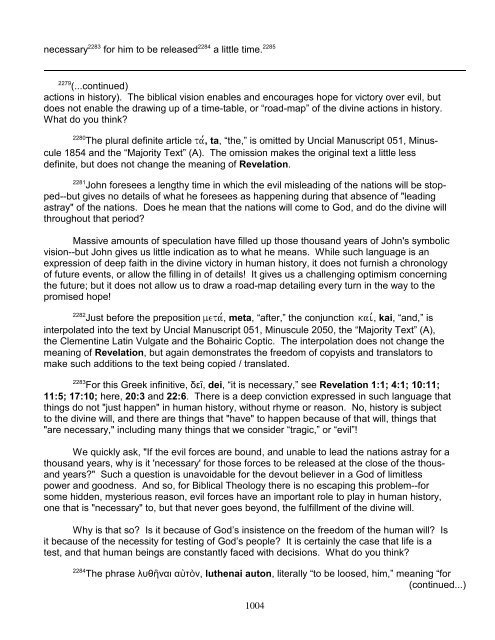Revelation 20 - In Depth Bible Commentaries
Revelation 20 - In Depth Bible Commentaries
Revelation 20 - In Depth Bible Commentaries
You also want an ePaper? Increase the reach of your titles
YUMPU automatically turns print PDFs into web optimized ePapers that Google loves.
2283 2284 2285<br />
necessary for him to be released a little time.<br />
2279<br />
(...continued)<br />
actions in history). The biblical vision enables and encourages hope for victory over evil, but<br />
does not enable the drawing up of a time-table, or “road-map” of the divine actions in history.<br />
What do you think?<br />
2280<br />
The plural definite article ta, ta, “the,” is omitted by Uncial Manuscript 051, Minuscule<br />
1854 and the “Majority Text” (A). The omission makes the original text a little less<br />
definite, but does not change the meaning of <strong>Revelation</strong>.<br />
2281<br />
John foresees a lengthy time in which the evil misleading of the nations will be stopped--but<br />
gives no details of what he foresees as happening during that absence of "leading<br />
astray" of the nations. Does he mean that the nations will come to God, and do the divine will<br />
throughout that period?<br />
Massive amounts of speculation have filled up those thousand years of John's symbolic<br />
vision--but John gives us little indication as to what he means. While such language is an<br />
expression of deep faith in the divine victory in human history, it does not furnish a chronology<br />
of future events, or allow the filling in of details! It gives us a challenging optimism concerning<br />
the future; but it does not allow us to draw a road-map detailing every turn in the way to the<br />
promised hope!<br />
2282<br />
Just before the preposition meta, meta, “after,” the conjunction kai, kai, “and,” is<br />
interpolated into the text by Uncial Manuscript 051, Minuscule <strong>20</strong>50, the “Majority Text” (A),<br />
the Clementine Latin Vulgate and the Bohairic Coptic. The interpolation does not change the<br />
meaning of <strong>Revelation</strong>, but again demonstrates the freedom of copyists and translators to<br />
make such additions to the text being copied / translated.<br />
2283<br />
For this Greek infinitive, äå, dei, “it is necessary,” see <strong>Revelation</strong> 1:1; 4:1; 10:11;<br />
11:5; 17:10; here, <strong>20</strong>:3 and 22:6. There is a deep conviction expressed in such language that<br />
things do not "just happen" in human history, without rhyme or reason. No, history is subject<br />
to the divine will, and there are things that "have" to happen because of that will, things that<br />
"are necessary," including many things that we consider “tragic,” or “evil”!<br />
We quickly ask, "If the evil forces are bound, and unable to lead the nations astray for a<br />
thousand years, why is it 'necessary' for those forces to be released at the close of the thousand<br />
years?" Such a question is unavoidable for the devout believer in a God of limitless<br />
power and goodness. And so, for Biblical Theology there is no escaping this problem--for<br />
some hidden, mysterious reason, evil forces have an important role to play in human history,<br />
one that is "necessary" to, but that never goes beyond, the fulfillment of the divine will.<br />
Why is that so? Is it because of God’s insistence on the freedom of the human will? Is<br />
it because of the necessity for testing of God’s people? It is certainly the case that life is a<br />
test, and that human beings are constantly faced with decisions. What do you think?<br />
2284<br />
The phrase ëõèíáé áôí, luthenai auton, literally “to be loosed, him,” meaning “for<br />
(continued...)<br />
1004

















